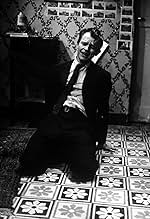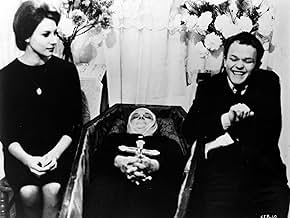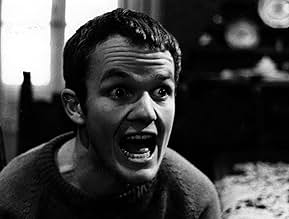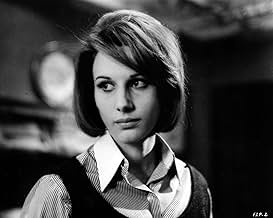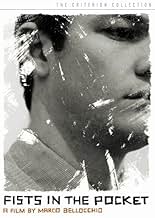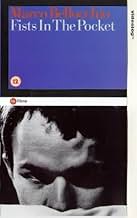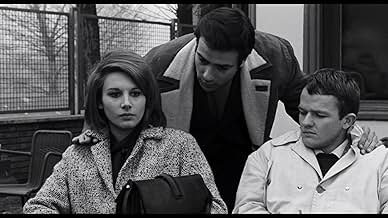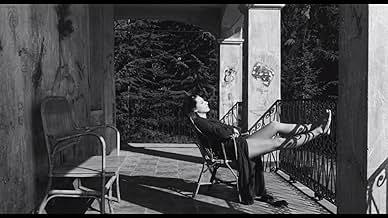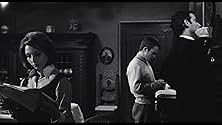NOTE IMDb
7,6/10
5,4 k
MA NOTE
Un jeune homme prend des mesures drastiques pour débarrasser sa famille dysfonctionnelle de ses nombreux problèmes.Un jeune homme prend des mesures drastiques pour débarrasser sa famille dysfonctionnelle de ses nombreux problèmes.Un jeune homme prend des mesures drastiques pour débarrasser sa famille dysfonctionnelle de ses nombreux problèmes.
- Réalisation
- Scénario
- Casting principal
- Récompenses
- 4 victoires et 5 nominations au total
Pier Luigi Troglio
- Leone
- (as Pierluigi Troglio)
Jeannie McNeil
- Lucia
- (as Jenny Mac Neil)
Avis à la une
This first effort by writer/director Marco Bellocchio has been called a drama by some, and a horror film by others. It is both. It is neither.
It is a view of a dysfunctional family. I almost had the impression they cam from a long line of incest like The People Under the Stairs. One wants to get away, another has epilepsy, the mother is blind, one seems to be developmentally disabled, and the last, Giulia (Paola Pitagora)is really not classifiable, but she sure seems to spend a lot of time very close to her brother Ale (Lou Castel).
Ale feels sorry for his older brother, Augusto (Marino Masé) and hatches a plan to drive the rest of the family, including himself off a cliff so his brother can get on with his life.
His plan fails, so he starts doing them in one by one.
Watching him is mesmerizing. You just have to see what he is going to try next. In the meantime, the family just acts as crazy as you would expect.
Bellocchio went on to direct many more great films including A Leap in the Dark, The Prince of Homburg, and The Religion Hour. It is amazing his first was so good.
It is a view of a dysfunctional family. I almost had the impression they cam from a long line of incest like The People Under the Stairs. One wants to get away, another has epilepsy, the mother is blind, one seems to be developmentally disabled, and the last, Giulia (Paola Pitagora)is really not classifiable, but she sure seems to spend a lot of time very close to her brother Ale (Lou Castel).
Ale feels sorry for his older brother, Augusto (Marino Masé) and hatches a plan to drive the rest of the family, including himself off a cliff so his brother can get on with his life.
His plan fails, so he starts doing them in one by one.
Watching him is mesmerizing. You just have to see what he is going to try next. In the meantime, the family just acts as crazy as you would expect.
Bellocchio went on to direct many more great films including A Leap in the Dark, The Prince of Homburg, and The Religion Hour. It is amazing his first was so good.
When this film first appeared in the 1960s, the effect was so startlingly individual: there had never been a film as bold, as seemingly unhinged, yet as ruthlessly controlled, as this first feature by Marco Bellocchio. The wonderfully atmospheric black-and-white cinematography seemed to be developed from some dingy dream which dared to bring out into the open the most heinous family secrets, yet the utterly dispassionate fury which animated the most frenzied sequences was so freakish it was almost funny. This constant tension somehow allowed for a sneaky kind of compassion to enter the movie, so that the family dynamics, though extreme, seemed to come out of a common nightmare. FISTS IN THE POCKET remains an embattled cry for a new society, by focusing on the remnants of the diseased upper classes, yet this tale of sound and fury seems to have been made in the kind of frenzied reverie that is analogous to the stream-of-conscious jumble which William Faulkner used at the beginning of THE SOUND AND THE FURY, and to the same effect, i.e., to chart a family's disintegration as a mirror to the decaying grandeur of a dying society.
The Sixties was a time of breaking rules and exploring social themes and political ideas that weren't allowed to be expressed in the repressive Fifties. It was a Golden Era of Italian cinema, producing Antonioni's, Visconti's and Fellini's best films, along with so many gems like Olmi's "Il Posto", Germi's "Divorce: Italian Style" and Monicelli's "The Organiser." "Fists in the Pocket" stands out for its dark subject matter, which examines the mind of a sociopath.
While this was not new ground—Clouzot's "Diabolique", Clement's "Purple Noon", Powell's "Peeping Tom" and Hitchcock's more lurid "Psycho" allowed us into the head of a killer—"Fists in the Pocket" portrays a much more nuanced character. What those films don't spend a lot of time on is the motivation behind their characters' actions, outside of their own amoral nature or perhaps some hinted trauma. In this film, while we certainly don't sympathise with the characters' actions, we clearly understand their motivations.
The protagonist of the film is Sandro, but I'd argue that the main character is the family, since it's the family dynamic that drives all action in the film. Sandro and two of his three siblings have varying degrees of epilepsy, and all three grown children live with and care for their blind mother. There's a definite sense of claustrophobia and dread in this family, who all seem trapped by their own love for each other. Their desire to break free of their mother's control and the burden of caring for each other leads to plans being hatched and tragic consequences.
It's quite an oddball story, almost Lynchian, but what makes the characters so utterly believable is the unpredictability of their behaviour, along with some excellent acting, particularly by Lou Castel, who allows us to see into his mind without saying a word. Add to that a soundtrack by Ennio Morricone and absolutely sublime photography—it's one of those rare films where you can frame almost every shot—and you've got one of the standout films from a standout period of filmmaking.
While this was not new ground—Clouzot's "Diabolique", Clement's "Purple Noon", Powell's "Peeping Tom" and Hitchcock's more lurid "Psycho" allowed us into the head of a killer—"Fists in the Pocket" portrays a much more nuanced character. What those films don't spend a lot of time on is the motivation behind their characters' actions, outside of their own amoral nature or perhaps some hinted trauma. In this film, while we certainly don't sympathise with the characters' actions, we clearly understand their motivations.
The protagonist of the film is Sandro, but I'd argue that the main character is the family, since it's the family dynamic that drives all action in the film. Sandro and two of his three siblings have varying degrees of epilepsy, and all three grown children live with and care for their blind mother. There's a definite sense of claustrophobia and dread in this family, who all seem trapped by their own love for each other. Their desire to break free of their mother's control and the burden of caring for each other leads to plans being hatched and tragic consequences.
It's quite an oddball story, almost Lynchian, but what makes the characters so utterly believable is the unpredictability of their behaviour, along with some excellent acting, particularly by Lou Castel, who allows us to see into his mind without saying a word. Add to that a soundtrack by Ennio Morricone and absolutely sublime photography—it's one of those rare films where you can frame almost every shot—and you've got one of the standout films from a standout period of filmmaking.
This is a very good movie, but it's certainly not for anyone. I can't even fathom it's been created 60 years ago, it's too insane, bleak, weird. There is not even one likeable character. Some of them are not unlikeable but they're just too uninteresting to root for, so the viewer focuses on the unlikeable ones. And as a character study, this movie is exciting to watch, because the protagonists are faschinating. Alessandro, Julia and, incidentally, Augusto.
It's like watching a car accident. You're afraid that you will see some ugly things when you're passing by, things that might haunt you but you can't help yourself and you take a look.
Funny thing : Whereas it's bleak, it still remains entertaining and exciting. Things get nasty at some point, but it never gets unbearable to watch. I was curious to see where it goes even though i sensed that there are no happy endings here, and i am not too fond of sad ones.
Acting is amazing. Lou Castel's acting performance is like it's coming from the future, too fresh and timeless.
FISTS IN THE POCKET is a very good psychological drama (-thriller). Beware though, it's not for the faint of heart.
It's like watching a car accident. You're afraid that you will see some ugly things when you're passing by, things that might haunt you but you can't help yourself and you take a look.
Funny thing : Whereas it's bleak, it still remains entertaining and exciting. Things get nasty at some point, but it never gets unbearable to watch. I was curious to see where it goes even though i sensed that there are no happy endings here, and i am not too fond of sad ones.
Acting is amazing. Lou Castel's acting performance is like it's coming from the future, too fresh and timeless.
FISTS IN THE POCKET is a very good psychological drama (-thriller). Beware though, it's not for the faint of heart.
The family in Marco Bellocchio's startling debut "Fists in the Pocket" make the Femms of "The Old Dark House" seem normal. These indolent Italians laze around all day taunting each other at every opportunity while son Allessandro, (a truly terrific Lou Castel), contemplates the best ways to rid himself of the others, including his blind mother, for the sake of the one brother he cares about. This darkly funny satire wasn't like other Italian films of the time, taking an almost putrid look at the family values Italians hold most dear; a comedy about matricide, fratricide and possible incest that actually manages to be quite touching at times. It's also a movie that takes its time. For a director making only his first feature, Bellocchio bravely put narraitve on the back-burner opting instead for an atmosphere as lazy as his characters and killing off a number of sacred cows in the process. The Establishment hated it while young critics loved it though not enough to make it anything other than a cult movie and it's seldom revived. Perhaps its reputation outweighs its numerous qualities but however you look at it, it's a one-off and well worth seeing.
Le saviez-vous
- AnecdotesThe house, the film's main location, is the house director Marco Bellocchio spent his childhood days in.
- GaffesWhen the whole family is having dinner, Augusto is seated at one corner of the table and the mother is sitting on a side at the other corner. The cat is shown to be eating meat off the mother's plate in one scene, but in the next scene Augusto is shown picking up the cat as if was right next to him on the table. Once he removes the cat, the next camera angle again shows Augusto and the mother at opposite ends.
- Citations
Alessandro: I'm a volcano of ideas.
- ConnexionsEdited into Sorelle (2006)
- Bandes originalesExcerpt from La Traviata
composed by Giuseppe Verdi (uncredited)
lyrics by Francesco Maria Piave (uncredited)
Meilleurs choix
Connectez-vous pour évaluer et suivre la liste de favoris afin de recevoir des recommandations personnalisées
- How long is Fists in the Pocket?Alimenté par Alexa
Détails
- Date de sortie
- Pays d’origine
- Sites officiels
- Langues
- Aussi connu sous le nom de
- Fists in the Pocket
- Lieux de tournage
- Société de production
- Voir plus de crédits d'entreprise sur IMDbPro
- Durée1 heure 50 minutes
- Couleur
- Mixage
- Rapport de forme
- 1.85 : 1
Contribuer à cette page
Suggérer une modification ou ajouter du contenu manquant

Lacune principale
By what name was Les poings dans les poches (1965) officially released in India in English?
Répondre
![Regarder Trailer [OV]](https://m.media-amazon.com/images/M/MV5BNjc5ZDU5NDgtZTliZC00MjQwLThjNjItMDhjZmFmZGMxZTI2XkEyXkFqcGdeQXRyYW5zY29kZS13b3JrZmxvdw@@._V1_QL75_UY281_CR6)
